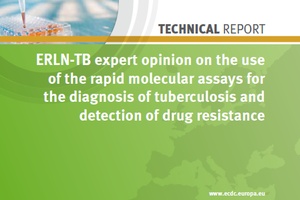ECDC technical report: Use of rapid molecular assays for diagnosing TB and detecting drug resistance
The use of rapid molecular assays has diagnostic value in tuberculosis identification and detection of drug resistance, although there is not enough evidence to recommend these tools in all populations and situations and they should not replace standard diagnostic methods.
The conclusion is part of an expert opinion prepared by the European Reference Laboratory Network for TB (ERLN-TB) which was published today (08 Jul 2013).
The document is a basis for EU/EEA Member States when they consider the use of the rapid molecular assays in their TB control programmes. It is founded on a systematic review on evidence extracted from papers published in peer-review journals, existing systematic reviews, official policy documents and guidelines.
According to the report, implementation of rapid molecular assays for rapid detection of TB, multidrug resistant tuberculosis (MDR TB) and extensively drug resistant tuberculosis (XDR TB) should take place in laboratories with proven capability to run molecular tests and where quality control systems have been implemented. Also, the guidance should be considered in association with an understanding of the population being assessed (the prevalence of TB and /or MDR-TB in the population).
Rapid molecular assays
MDR TB and XDR TB are threats to the elimination of tuberculosis. The ability to rapidly and accurately detect Mycobacterium tuberculosis and drug resistance in clinical specimens is essential for the appropriate treatment of TB patients and for preventing further spread of drug-resistant strains. New, highly specific, sensitive, and rapid tools to detect active TB and drug resistance are needed.
Rapid molecular assays for the detection of TB and drug-resistant TB in clinical specimens are molecular assays based on detection of specific nucleotide sequences and/or mutations in the M. tuberculosis genome, indicative of the presence of M. tuberculosis and/or associated with drug resistance. These assays are capable of detecting resistance to the most common drugs used to treat TB (rifampicin; rifampicin and isoniazid; or ethambutol, fluoroquinolones and injectable drugs).
Source: ECDC



 ERLN-TB expert opinion on the use of the rapid molecular assays for the diagnosis of tuberculosis and detection of drug resistance
ERLN-TB expert opinion on the use of the rapid molecular assays for the diagnosis of tuberculosis and detection of drug resistance